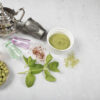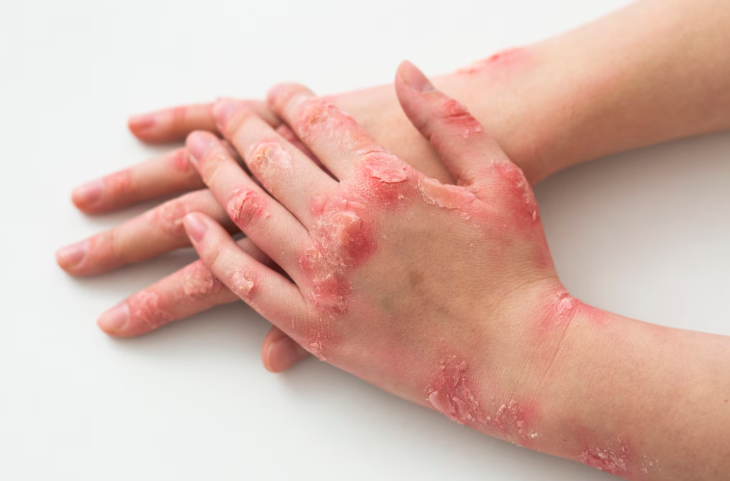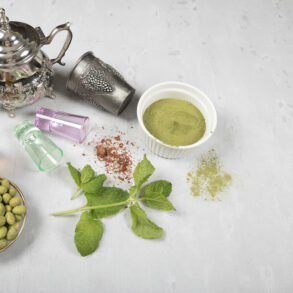Eczema, or Atopic Dermatitis, is a chronic, relapsing inflammatory skin condition that affects millions worldwide, causing intense itching, dry skin, rashes, and a significant reduction in quality of life.
While modern medicine offers treatments like corticosteroids and immunosuppressants, many patients seek gentler, more holistic alternatives due to concerns about side effects or the inability of these treatments to address the root cause.
This has led to a growing global interest in Ayurveda, the ancient Indian system of medicine. The central question many are asking is: Can Ayurveda cure eczema? What studies say on this matter is a complex interplay of traditional wisdom, emerging scientific research, and clinical observation.
This extensive article delves deep into the Ayurvedic perspective on eczema, analyzes the existing scientific evidence, and provides a balanced view on the potential and limitations of Ayurvedic interventions.
We will systematically explore the principles, treatments, and research to answer the pressing question: Can Ayurveda cure eczema? What studies say may surprise you and offer new hope for those struggling with this stubborn condition.
1. Understanding Eczema: The Modern Medical Viewpoint
Before we can explore the question “Can Ayurveda cure eczema? What studies say,” it is crucial to understand the condition from a contemporary medical perspective.
Eczema is characterized by a defective skin barrier and an overactive immune system response to environmental triggers. Symptoms include:
- Intense pruritus (itching)
- Erythema (redness)
- Xerosis (dryness)
- Scaling, crusting, and oozing in acute flares
- Lichenification (thickening of the skin) in chronic cases
The exact cause is multifactorial, involving a combination of:
- Genetics: Mutations in the filaggrin gene, which is crucial for skin barrier function.
- Immune Dysregulation: An overactive Th2 (T-helper 2) immune response.
- Environmental Triggers: Allergens (dust mites, pollen), irritants (soaps, detergents), microbes (S. aureus), and stress.
Modern treatment is primarily suppressive and involves:
- Emollients: To repair the skin barrier.
- Topical Corticosteroids: To reduce inflammation during flares.
- Topical Calcineurin Inhibitors: As a steroid-sparing agent.
- Systemic Immunosuppressants: For severe cases.
- Biologics: Such as Dupilumab, which target specific pathways in the immune system.
While effective for management, these treatments often do not offer a permanent solution and can have side effects with long-term use. This therapeutic gap is where the inquiry into Can Ayurveda cure eczema? What studies say becomes profoundly relevant for patients seeking a different path.
2. The Ayurvedic Paradigm: Eczema as a Manifestation of Systemic Imbalance
Ayurveda does not recognize “eczema” as a single, isolated disease. Instead, it views such skin conditions as external symptoms of a deep-seated internal imbalance, primarily involving digestion and metabolism. The central concept here is Ama, or toxins, which are the byproducts of improper digestion.
According to Ayurveda, the skin is directly connected to the state of the Rasa and Rakta Dhatus (the plasma and blood tissues). When digestive fire (Agni) is weakened, poorly digested food particles form Ama. This Ama combines with imbalances in the doshas (bio-energies) to vitiate the Rakta Dhatu (blood), leading to skin diseases, collectively known as Kushta.
Eczema is most closely correlated with a condition called Vicharchika. The pathogenesis is described as follows:
- Agni Mandya (Weak Digestion): The root cause. Impaired digestion leads to the formation of Ama.
- Dosha Prakopa (Aggravation of Doshas): The specific doshic imbalance determines the nature of the eczema.
- Pitta Dosha: Aggravated Pitta (fire and water) is the primary culprit, causing intense inflammation, redness, burning sensation, and oozing. Pitta-type eczema is often acute and fiery.
- Vata Dosha: Aggravated Vata (air and ether) causes extreme dryness, scaling, cracking, roughness, and intense itching. This is common in chronic, lichenified eczema.
- Kapha Dosha: Aggravated Kapha (earth and water) leads to swelling, itching, oozing, and a feeling of coldness and heaviness on the skin.
- Ama and Vitiated Doshas Mix: The Ama combines with the aggravated doshas.
- Rakta Dushiti (Vitiation of Blood): This toxic mixture enters and contaminates the Rakta Dhatu.
- Manifestation on Skin (Twak): The vitiated blood travels through the channels (Srotas) and manifests on the skin as the lesions of Vicharchika (eczema).
Therefore, the Ayurvedic approach is fundamentally different. It does not ask, “What cream will suppress this rash?” but rather, “What systemic imbalance is causing this toxin to appear on the skin?” This holistic reframing is central to understanding the research on Can Ayurveda cure eczema? What studies say about this systemic approach.
3. The Multimodal Ayurvedic Treatment Protocol for Eczema
Ayurvedic management of eczema is not a single-product solution but a comprehensive, personalized protocol known as Chikitsa Samprapti. The goal is to detoxify the body, pacify the aggravated doshas, restore digestive strength, and repair the skin. This multi-pronged strategy is what researchers investigate when they ask, Can Ayurveda cure eczema? What studies say about its efficacy often hinges on this comprehensive approach.
3.1. Dietary and Lifestyle Modifications (Ahar and Vihar)
This is the cornerstone of treatment. Without correcting the root cause of Ama formation, other treatments are considered palliative.
- Pacifying Pitta and Vata: A diet that is cooling, hydrating, and easy to digest is prescribed. This includes sweet, bitter, and astringent tastes. Bitter gourd, cucumber, bottle gourd, and old rice are emphasized.
- Avoiding Aggravating Foods: Spicy, sour, salty, fermented, and fried foods are strictly avoided, as they aggravate Pitta. Yogurt, seafood, and processed foods are also typically restricted.
- Lifestyle: Stress management through yoga and meditation, adequate sleep, and avoiding excessive sun exposure are crucial recommendations.
3.2. Herbal Formulations (Aushadhi)
A vast pharmacopoeia of herbs is used, both internally and externally, to purify the blood, reduce inflammation, and heal the skin.
- Blood Purifiers (Raktashodhaka): Herbs like Manjistha (Rubia cordifolia), Neem (Azadirachta indica), Guduchi (Tinospora cordifolia), and Sariva (Hemidesmus indicus) are central to treatment. They are believed to clear toxins from the Rakta Dhatu.
- Anti-inflammatory and Skin Healers: Turmeric (Curcuma longa), Haridra, is used for its potent anti-inflammatory and antimicrobial properties. Aloe Vera is used for its cooling and healing effects.
- Internal Rejuvenators: Amalaki (Emblica officinalis) is used to cool Pitta and enhance immunity.
3.3. Panchakarma: The Detoxification Therapy
For moderate to severe or chronic eczema, Panchakarma is considered the most definitive treatment. It is a series of bio-purification procedures designed to eliminate the deep-seated Ama and vitiated doshas from the body.
- Vamana (Therapeutic Emesis): Used to eliminate excess Kapha and Pitta from the upper gastrointestinal tract.
- Virechana (Therapeutic Purgation): This is a key therapy for Pitta-dominated conditions like eczema. It cleanses the small intestine and liver, the main seats of Pitta, removing accumulated toxins through the lower GI tract.
- Basti (Medicated Enema): Primarily used to pacify Vata dosha, which is often involved in the chronicity and dryness of eczema.
- Raktamokshana (Bloodletting): A procedure to directly purify the vitiated blood. In modern practice, this is often done with leech therapy, which is found to have anti-inflammatory, anticoagulant, and anesthetic effects.
The comprehensive nature of this protocol is a key focus when researchers explore Can Ayurveda cure eczema? What studies say about Panchakarma, in particular, are highly promising.
4. Analyzing the Evidence: What Studies Say About Ayurveda and Eczema
This is the core of our investigation. The body of rigorous, clinical research on Ayurveda for eczema is growing but still requires more large-scale, robust trials. However, the existing evidence provides compelling insights. So, can Ayurveda cure eczema? What studies say can be broken down into several categories.
4.1. Clinical Studies on Whole-System Ayurveda
Several studies have evaluated the entire Ayurvedic protocol, including diet, herbs, and Panchakarma.
- A Landmark 1993 Study: Published in the “Lancet,” this study treated 82 patients with severe, chronic eczema with a tailored Ayurvedic regimen. The results were striking: 76% of patients showed over 90% improvement, with no relapses reported during a 2-year follow-up period. The study concluded that the Ayurvedic treatment was “highly effective and safe.” This is one of the most frequently cited papers when discussing can Ayurveda cure eczema? What studies say in its favor.
- A 2014 Clinical Trial: A study published in the “Journal of Clinical and Experimental Dermatology Research” involved 40 patients with eczema. The group receiving Ayurvedic treatment (internal herbs and external applications) showed a statistically significant improvement in the SCORAD (Scoring Atopic Dermatitis) index compared to the control group using a standard emollient.
- A 2017 Case Series: Published in “Ayurveda,” this series documented three cases of chronic eczema successfully treated with a combination of Virechana (purgation therapy) and internal medications. All patients showed marked clinical improvement and remained in remission during the follow-up period, suggesting that Ayurveda can manage eczema effectively by targeting the root cause.
These whole-system studies suggest that the holistic approach of Ayurveda can lead to significant and sustained improvement, potentially offering what patients perceive as a “cure” in the sense of long-term remission.
4.2. In-Vitro and Phytochemical Studies on Key Herbs
A significant body of research has analyzed individual Ayurvedic herbs to understand their mechanisms of action. This reductionist approach helps bridge the gap between traditional claims and modern pharmacology. When asking can Ayurveda cure eczema? What studies say about its individual components provides strong scientific rationale.
- Neem (Azadirachta indica): Studies have confirmed its potent antibacterial activity against Staphylococcus aureus, a bacterium that commonly colonizes and exacerbates eczema lesions. It also has demonstrated anti-inflammatory and immunomodulatory properties.
- Manjistha (Rubia cordifolia): Research has shown that Manjistha contains antioxidants and compounds that can inhibit the release of pro-inflammatory cytokines, which are key players in the inflammatory cascade of eczema. Its “blood-purifying” action can be interpreted as a detoxifying and anti-inflammatory effect on the systemic level.
- Turmeric (Curcuma longa): The active compound, curcumin, is one of the most studied natural anti-inflammatory agents in the world. It inhibits NF-kB, a key protein complex that triggers inflammation, and has been shown to be effective in various inflammatory conditions. Topical curcumin has been found to improve skin health and reduce inflammation.
- Guduchi (Tinospora cordifolia): This herb is a powerful immunomodulator. Studies show it can help regulate the Th1/Th2 balance, which is crucial in eczema where the Th2 response is overactive. It helps the body adapt to stress, another trigger for eczema flares.
The scientific validation of these herbs strengthens the argument that Ayurveda can treat eczema through multiple, synergistic biological pathways.
4.3. Studies on Specific Procedures: Panchakarma and Leech Therapy
- Virechana (Purgation Therapy): A study published in the “Ayurvedic Journal of Health” in 2015 found that Virechana led to a significant reduction in SCORAD scores and serum IgE levels (a marker of allergic response) in patients with eczema. This provides a scientific basis for the ancient belief that purging the intestines clears systemic inflammation.
- Leech Therapy (Raktamokshana): Clinical studies, including one published in the “Journal of Ayurveda and Integrative Medicine,” have reported excellent results with leech therapy for chronic, stubborn eczema plaques. The therapy not only reduces local inflammation and itching but also improves blood flow to the area, promoting healing. The leech saliva contains hirudin (an anticoagulant), hyaluronidase (a spreading agent), and anesthetic and anti-inflammatory compounds, which together provide a unique therapeutic effect.
The evidence from these procedure-based studies adds another layer to the discussion on can Ayurveda cure eczema? What studies say about Panchakarma provides a strong case for its role in managing complex cases.
5. Case Studies: Anecdotal Evidence and Clinical Observations
Beyond controlled trials, countless clinical case reports from Ayurvedic practitioners worldwide offer compelling anecdotal evidence. These cases often involve patients who have found little relief with conventional medicine.
- Case Study 1: A Child with Severe Atopic Dermatitis. A 6-year-old child with widespread, oozing eczema unresponsive to topical steroids was treated with a gentle Pitta-pacifying diet, internal herbs like Guduchi and Sariva, and topical applications of Neem and Chandana (sandalwood) paste.
Within 3 months, the oozing stopped, the skin lesions healed significantly, and the itching reduced dramatically. The child was able to discontinue steroid use. - This case illustrates how Ayurveda can manage eczema in a vulnerable population where long-term steroid use is a concern.
- Case Study 2: An Adult with Chronic Lichenified Eczema. A 45-year-old with a 20-year history of eczema on the hands and feet, characterized by extreme dryness and thickening, underwent Virechana and a course of internal medications including Kaishore Guggulu (a classical formulation for blood purification and inflammation).
Over six months, the skin texture normalized, the thickening resolved, and the patient experienced long-term remission. This demonstrates the potential of Ayurveda to reverse chronic pathology.
While anecdotal, these successes are the driving force behind the continued use and investigation of Ayurveda. They prompt the scientific community to keep asking, can Ayurveda cure eczema? What studies say needs to be expanded to include more of these real-world success stories in a systematic way.
6. A Critical Analysis: Limitations, Challenges, and the Path Forward
A balanced perspective is essential. While the evidence is promising, there are significant challenges and limitations that must be acknowledged when evaluating the question, can Ayurveda cure eczema? What studies say also points to these hurdles.
- The “Cure” Conundration: In modern medical terms, “cure” often implies the complete and permanent eradication of a disease. For a complex, multifactorial condition like eczema, which has a strong genetic component, this is a high bar.
Ayurveda may be better understood as a system that can induce long-term, drug-free remission by correcting the underlying functional imbalances. It addresses the “soil” rather than just the “seed.”
Therefore, the question “can Ayurveda cure eczema?” might be reframed as “Can Ayurveda effectively manage and potentially reverse eczema by addressing its root causes?” The studies suggest a strong “yes” to the latter. - Need for More Rigorous Research: Many existing studies have limitations such as small sample sizes, lack of proper blinding, and difficulty in standardizing the holistic interventions. Large-scale, randomized controlled trials that can control for the personalized nature of Ayurvedic treatment are complex and expensive but are desperately needed.
- Standardization and Quality Control: The variability in the quality of Ayurvedic herbs and the skill of practitioners can affect outcomes. Contamination with heavy metals in some non-reputable products is a serious concern. Seeking treatment from qualified, registered practitioners and using products from reputable companies that perform third-party testing is paramount.
- Time and Commitment: Ayurvedic treatment is not a quick fix. It requires significant patient commitment to dietary and lifestyle changes over months or even years. This can be a barrier for some individuals.
The path forward lies in Integrative Medicine. The future is not Ayurveda versus Allopathy, but a synergistic model.
A patient might use a topical steroid for an acute, severe flare under a dermatologist’s guidance while simultaneously working with an Ayurvedic practitioner to correct the underlying Agni and doshic imbalance for long-term management. Research into this integrative model is the next frontier.
7. Frequently Asked Questions (FAQs)
Q1: Is Ayurvedic treatment safe for children with eczema?
A: Yes, when administered by a qualified Ayurvedic practitioner, it is generally considered safe. Pediatric Ayurveda (Kaumarabhritya) uses gentle herbs, dietary corrections, and mild procedures tailored for children. It is a popular choice for parents concerned about the long-term use of steroids on a child’s sensitive skin.
Q2: How long does it take to see results with Ayurveda for eczema?
A: This varies greatly depending on the severity, chronicity, and the patient’s adherence to the protocol. Some see improvements in itching and redness within a few weeks, but significant skin healing and sustained remission often take 3 to 6 months or longer. Ayurveda is a marathon, not a sprint.
Q3: Can I use Ayurvedic creams along with my steroid ointments?
A: Do not self-prescribe. It is crucial to consult both your dermatologist and Ayurvedic practitioner. Some combinations may be beneficial, while others could interact or be counterproductive. An integrated approach under professional guidance is the safest and most effective path.
Q4: Are all Ayurvedic herbs and treatments suitable for every type of eczema?
A: No. This is a critical point. Ayurveda is personalized. The treatment for a hot, red, oozing (Pitta) eczema is very different from that for a dry, scaly (Vata) eczema. A qualified practitioner will diagnose your Prakriti (constitution) and Vikriti (imbalance) to create a tailored plan. This personalized nature is key to understanding the research on can Ayurveda cure eczema? What studies say must account for this individualization.
Q5: Where can I find a reliable Ayurvedic practitioner?
A: Look for practitioners who have a Bachelor’s or Master’s degree in Ayurvedic Medicine and Surgery (BAMS/MD) from a recognized university and are licensed to practice. In India, check for registration with state councils. Internationally, look for certifications from reputable bodies in your country.
Conclusion: A Resounding Maybe, Leaning Towards Hope
So, after this deep dive into the principles, protocols, and evidence, we return to our central question: Can Ayurveda cure eczema? What studies say offers a compelling, though not yet definitive, picture.
The weight of existing evidence from clinical trials on whole-system Ayurveda, phytochemical studies on its key herbs, and promising research on Panchakarma strongly suggests that Ayurveda is a highly effective and holistic system for managing eczema.
It may not “cure” the genetic predisposition, but it appears uniquely capable of inducing long-term, drug-free remission by addressing the fundamental digestive, metabolic, and immunological dysfunctions that drive the disease.
The ancient Ayurvedic sages viewed skin disease as an internal problem with an external expression.
Modern science is now beginning to validate this profound insight, revealing the intricate gut-skin axis and the role of systemic inflammation.
Therefore, the most accurate answer to “can Ayurveda cure eczema?” is that it offers a powerful path to deep healing that modern medicine often lacks. It provides not just a temporary suppression of symptoms, but a blueprint for restoring balance from the inside out.
For the millions suffering from the physical and emotional toll of eczema, Ayurveda represents a beacon of hope.
The journey requires patience, commitment, and the guidance of a skilled practitioner, but the potential reward a life free from the relentless itch and inflammation is immense.
The collective findings from various studies indicate that for those asking can Ayurveda cure eczema, the answer is a hopeful and promising “yes, it can provide profound and lasting relief.”
The future of eczema treatment may well lie in the intelligent integration of Ayurveda’s timeless wisdom with the precision tools of modern dermatology.










